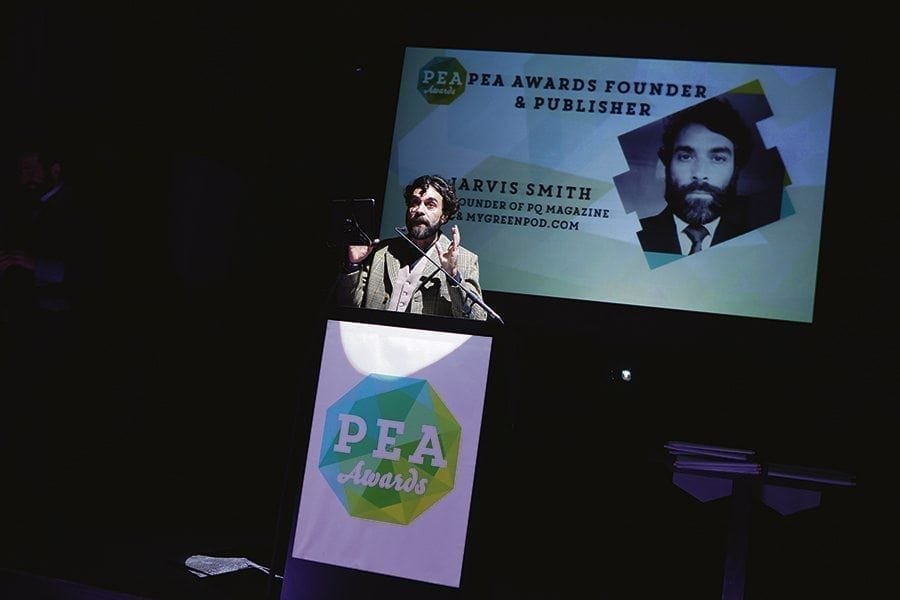[row]
[col span=”6″]
Last year’s People. Environment. Achievement. (P.E.A.) Awards ceremony was a roaring success; the glamorous green carpet event honoured people who are walking the talk and championing successful approaches to sustainability in their respective fields – from technology and travel to community and campaign work.
Unlike other sustainability awards, the P.E.A.s celebrate individuals and teams rather than products and brands. They recognise the power of individuals when it comes to shifting paradigms, and send a clear message that positive change is in our own hands.
[/col]
[col span=”6″]
The theme for the awards ceremony was ‘Unity’, and the event demonstrated how big business and consumers can unite for positive change.
The winners are pioneering eco-warriors, heroes and champions who serve as living testament to the fact that individuals and groups can inspire real change where other leaders have failed.
Here are just some of the winners from the night and why they deserve to be recognised and celebrated. The other winners were covered in the spring issue of PQ.
[/col]
[/row]
[divider width=”full” height=”1px”]
[row]
[col span=”3″]
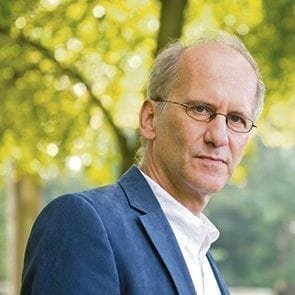
Award: Finance
Jamie Hartzell
Founder, Ethex
Ethex was set up to make positive investing easy to understand and easy to do. It helps individuals who are taking control of their finances and choosing to invest in businesses that address a social or environmental need as well as delivering a financial return).
Ethex brings all the positive investment opportunities available together on one website, so individuals can build a portfolio of investments – from community-owned renewable energy schemes and organic farms to charity bonds and the acquisition of pubs and shops for the local community. Ethex raised £6.8 million for more than 30 businesses before it celebrated its second birthday.
Ethex’s view is that wider participation in financial markets is now unstoppable. The company produces an annual survey that tracks the growth of the positive investing marketplace, which now stands at £3.25 billion and includes 1.7 million people.
Positive investing is fast becoming a broad popular movement. The number of younger people investing is increasing, average investment amounts are rising and individual investors now tend to build a diversified portfolio of investments rather than just taking one single holding.
Jamie Hartzell’s leadership of Ethex has gone beyond starting a business to starting a movement of self-directed positive investors who are more connected to their money, feel in control of it, want to know where it goes and recognise that they can make a positive social impact with it.
‘Ethex needs to convince more people that they can take control of their own finances and actively invest in businesses they believe in’, Jamie told PQ. ‘Winning a P.E.A. Award has helped us to win public attention and has also boosted morale for the whole team.’
[/col]
[col span=”3″]
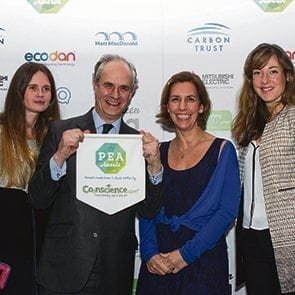
Award: NGO
Blue Marine Foundation
Team Award
70% of the Earth’s surface is water, yet 90% of our big fish are gone. 85% of world fish stocks are in crisis and marine degeneration is reaching a point of no return. If trends continue, there will be no more fish by 2048.
Yet the crisis is reversible if we create a worldwide network of Marine Protected Areas; the Blue Marine Foundation (BLUE)’s goal is to get 10% of the world’s oceans under protection by 2020.
BLUE was set up in 2010 by the team behind the award-winning documentary The End of the Line. The UK-registered charity actively lobbies the government to protect the UK’s overseas territories, which make up the world’s fifth-largest marine zone. Protecting just three of these territories would protect 5% – as opposed to 3% – of our oceans.
In its first year, BLUE brokered a landmark deal between the UK government and the Bertarelli Foundation to create the largest fully protected marine reserve in the world. The Chagos Marine Reserve doubled the area of ocean under protection.
BLUE has also pioneered an award-winning project in Lyme Bay, Dorset, that brings together fishermen, conservationists and scientists to establish a model of sustainable fishing. Using the Lyme Bay model, BLUE is on track to establish a network of managed marine areas around the UK coastline.
‘Winning the P.E.A. Award has made a huge difference to BLUE’, said Clare Brook, CEO of the Blue Marine Foundation. ‘As a small and young charity, being named NGO of the year by the P.E.A.s has given us a huge boost in terms of awareness and credibility. It has already helped us in our fundraising efforts, so we’ll be able to work more effectively to place more of the ocean under protection.’
[/col]
[col span=”3″]
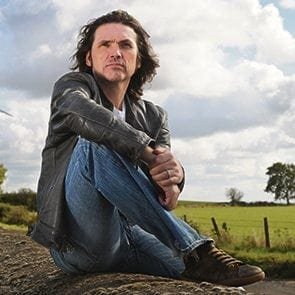
Award: Transport
Dale Vince
Founder, Ecotricity
Ecotricity installed the Electric Highway – a network of electric car charging stations on motorways and A roads from Land’s End to Perthshire – ‘to kickstart Britain’s electric car revolution’.
Britain’s first and biggest national network of electricity pumps was designed to address two problems that were stalling the uptake of electric cars in the UK: the scarcity of charging stations and the ‘range anxiety’ that left drivers worried they’d be stranded without juice before they got close to the next charge point.
Ecotricity, with founder Dale Vince at the helm, started building the Electric Highway in July 2011. The network, which started with a single electric vehicle electricity pump at Welcome Break’s South Mimms services, now covers almost all of Britain’s motorways – and is now branching out onto smaller roads as well.
Electric cars are only a realistic option if the infrastructure’s in place to support them. Charging points were previously concentrated in towns and city centres, making electric cars great city runarounds but impractical all-purpose vehicles. Now electric vehicle owners are able to make long journeys, meaning EVs are another step closer to becoming the most logical choice for all Britain’s drivers.
The best part is that the Electric Highway is completely free to use; swipe the card you receive after signing up and you’ll be able to plug in and charge up in the car parks of motorway service stations up and down the country.
Ecotricity focuses on installing fast chargers, or fast electricity pumps, on the Electric Highway. These units are designed to charge compatible electric vehicles from 0-80% in around 20-30 minutes. Just enough time for a coffee and a stretch of the legs before you’re back on the road. Genius.
[/col]
[col span=”3″]

Award: Travel & Tourism
Howard Carter
CEO & Founder, Incognito
Incognito insect repellent is a market-leader in the environmentally friendly travel market. The 100% natural and biodegradable products help make personal travel more sustainable by providing a viable alternative to the widely used chemical DEET. Many travellers feel they have to use this pesticide – which pollutes bodies of water and has been found to be toxic to animals – because of the protection it provides against insect bites. However, incognito has been clinically proved to protect against malaria (as long as you sleep under a mosquito net) without covering your skin with chemicals.
Containing completely natural and organic ingredients, incognito doesn’t pollute fragile ecosystems and is the only major insect repellent that has recycled plastic packaging. This saved over 1,000kg of plastic from landfill in 2012 and 2013. incognito is also a carbon-neutral company, and works with the Plant a Tree Today Foundation to cut carbon from its supply chain.
As a result of incognito sprays being sold in place of DEET, an estimated 5,500 litres of chemicals were diverted from waterways in 2013 alone. DEET is known to be toxic to several fish and plankton species – and the substance has been linked to fatal seizures, severe epidermal reactions, insomnia and impaired cognitive function in humans. In contrast, incognito insect repellent is safe to use on babies as young as four weeks old.
‘The Award is a fantastic achievement as we continually seek to improve on our already impressive track record of environmental, ethical and social policies’, said Howard Carter, CEO of incognito. ‘Our targets for the future include reducing our carbon footprint by 12% by 2016, donating 750 mosquito nets to Africa by 2019 and continuing to donate 10% of our total profits annually to charities around the world.’
[/col]
[/row]
[divider width=”full” height=”1px”]
[row]
[col span=”3″]
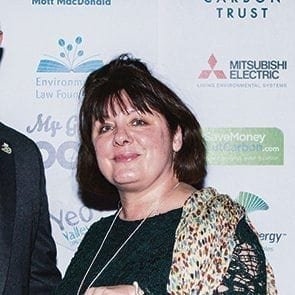
Award: Business
Christine Hynes
CEO, Climate Energy Homes
Christine Hynes was nominated for her pioneering construction company, Climate Energy Homes, which delivers affordable homes that meet the highest levels of energy efficiency.
Christine co-founded the company over 13 years ago and co-developed the innovative ecoTECH Fabric First and Passivhaus Build Systems that are at the core of Climate Energy Homes’ revolutionary building approach.
The ecoTECH Build Systems can be tailored to achieve the highest levels of energy efficiency, meeting Code for Sustainable Homes 4, 5 and 6, Passivhaus and Zero Carbon standards. Low energy use means significantly reduced energy bills, taking vulnerable residents out of fuel poverty and ensuring that all residents can have a warmer, more comfortable home.
Christine’s mission has been to prove that eco building can be just as cost-effective as a traditional build, if not more so. The recent housing scheme delivered in Rainham, London, is a great example of how Passivhaus techniques can be used to provide exceptionally high-performance homes for affordable rent. The 51 social housing homes have a higher specification than many far more expensive properties.
Thanks to Christine’s vision and determination, Climate Energy Homes has been able to provide warmer, healthier homes with energy costs that are a fraction of those of average UK households.
‘We hope that the P.E.A. Award will help to raise the profile of Climate Energy Homes within our sector’, Christine told PQ, ‘and put us in the spotlight as a pioneer of sustainable housing. It has been great to be rewarded and acknowledged as an inspiration within the market, and we will continue our commitment to the housing industry.
[/col]
[col span=”3″]
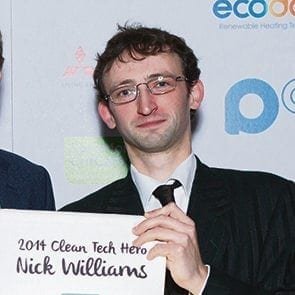
Award: Clean Tech
Nick Williams
Inventor iViTi
Nick Williams has come up with two pioneering inventions, which are now being developed and realised by iViTi Lighting. His first bright idea – and the one that caught the P.E.A. Award judges’ attention – is the AdrON (Automatic Demand Response in Lighting) bulb: the greenest, least disruptive solution to grid balancing during peak demand times.
The AdrON is an LED lamp that has internal batteries and uses grid frequency monitoring technology to detect, in real time, when there is excessive pressure on the grid. It then automatically, immediately and undetectably starts to use its own internal batteries until the grid gets back to ‘normal’, at which point the lamp reverts back to mains power.
By taking pressure off the grid, the AdrON reduces our reliance on dirty old power stations when demand for energy is high. When the grid has surplus power, the battery uses the excess energy to recharge itself.
By switching to battery operation when demand is highest, the AdrON helps organisations to save money by avoiding peak energy rates. Selling pre-purchased excess energy provides an extra revenue stream and a great incentive for change, allowing companies to show their commitment to a purpose beyond profit.
The lights stay on for up to three hours if there’s a power cut and come on automatically when an intruder or fire alarm sounds.
‘We entered because we believed that the principles behind the P.E.A. Awards clearly represent the ideology of iViTi’, said Trefor Jones, director of iViTi Lighting Limited. ‘As a company, iViTi wants to respond to energy shortages and climate change by creating pioneering new products that directly address these issues. This P.E.A. Award will inspire us as we continue to evolve.’
[/col]
[col span=”3″]
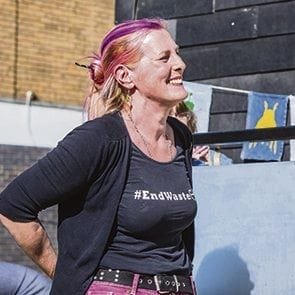
Award: Campaigner (Local)
Kat Fletcher
Resource Goddess, Freegle UK Director
Kat spends her waking hours interrupting the flow of usable goods to the waste stream, dreaming up creative reuse projects, participating in over 100 public ‘waste’ events each year, promoting the call to action to be less wasteful in every sphere and ‘connecting unwanted stuff with every man and his dog’.
With her extraordinary team of volunteers, Cat works tirelessly to make reuse free and easy for UK citizens – always inspiring resourcefulness and waste awareness, reduction and solutions. She has also voluntarily run the Brighton Freegle group for eight years, and over 20,000 locals are inspired to reuse about 10 tonnes of stuff every month across the city as a result.
This significant waste prevention system, which is run entirely on goodwill and peer-to-peer participation, creates $120,000 of economic value each year. As well as putting money back into the local community, the service provides creative and employment opportunities, builds community resilience and drives organisational and individual behaviour change.
Following a successful crowdfunding campaign, Cat has now also raised enough money (£11,333) to buy eight shipping containers. They’ll be used to create a reuse depot in Brighton & Hove where anyone in the city will be able to drop off items they want to pass on for reuse or repair. A scrap and materials store will be available for artists, students, schools, festivals and other creative projects, and a ‘library of things’ will be full of tools, ladders and other useful bits and pieces that people will be able to borrow.
‘There are so many amazing campaigners and innovators addressing the many and serious environmental and social issues we all face’, Cat told PQ. ‘Celebrating some of those achievements through the P.E.A. Awards really does help to cement hope and enable better collaboration – which in turn builds our collective impact and resilience.’
[/col]
[col span=”3″]

Award: Public Sector
Mike Deegan
Chief Executive, Central Manchester NHS Foundation Trust
Central Manchester NHS Foundation Trust (CMFT) has delivered a huge shift in environmental performance at a pace that’s ‘unheard of in the public sector’, all against a backdrop of enormous budgetary pressure and wider organisational change.
In early 2013 the Trust didn’t have a dedicated sustainability resource and was risking failure to meet even minimum statutory requirements.
In 2014, with the complete commitment and backing of the Trust’s senior management, a multi-disciplinary sustainability team was created with the aim of bringing the Trust to the forefront of sustainability within the NHS. The Trust has achieved impressive results quickly by leading change from the top while at the same time encouraging grassroots participation.
Within 12 months the Trust managed more change than many organisations achieve in decades. Hundreds of projects have been delivered by staff at all levels within the organisation, with the end result being a genuine shift in the way the Trust does business.
A Sustainable Development Management Strategy and Plan has now been approved by the Trust’s board, and an award-winning behaviour change campaign has reached 2,000 members of staff.
An anaerobic digestion scheme now handles food waste and a new waste contract and management process means that 95% of the Trust’s domestic waste is now recycled. There’s also been a significant reduction in the volume of healthcare waste that’s sent for incineration.
An electric van is used for on-site deliveries and a park-and-ride shuttle bus service has been set up for commuting staff and business travel, resulting in a 7% decrease in single-occupancy car journeys.
Reaching its agreed targets will save the Trust more than £300,000 per year, every year. CMFT says it ‘fully intends to lead the NHS in sustainable development’, and adds that ‘this is only possible thanks to the commitment and vision of our leadership team’.
[/col]
[/row]
[divider width=”full” height=”1px”]
[row]
[col span=”3″]

Award: Community
Clive Cobie
Woodland Manager, Woodland Skills
Clive Cobie arrived at Shadow Woods in 2000. Living and working in the woods, in the home he built himself from recycled and woodland materials, Clive spent the next eight years caring for and revitalising the woodland, developing his knowledge of traditional crafts and skills and learning about the flora, fauna and plant law around him.
Clive became a qualified NCFE Bushcraft Instructor in 2008, and has since devoted his time to developing the Woodland Skills Centre. Hundreds of individuals and groups are now able to enjoy the transformative experience of staying in Shadow Woods each year.
Clive and his team agree that the greatest reward is to see this transformation taking place – whether with a group of disaffected youngsters, corporates on leadership training, local scouts and school kids or simply families and friends who want to experience living at one with Nature.
Everything at Woodland Skills happens in rhythm with Nature. Under Clive’s guidance, the team preserves knowledge and skills such as recognising wildflowers, trees and birds, making a shelter, learning to make charcoal or collecting the brambles, hazel and other materials to make a basket.
It has all been made possible by Clive Cobie’s devotion to acquiring and sharing knowledge so that we can learn how to live in harmony with Nature.
‘We have been working the woodland for 15 years with the aim of giving people an opportunity to learn some country skills’, Clive told PQ. ‘We believe that if people take the opportunity to give something new a go – and then see what inspiration they gain from the experience – it is a means to a more wholesome life. One of the reasons we were nominated was the connection to Nature visitors have felt by immersing themselves in one or more of our courses.’
[/col]
[col span=”3″]
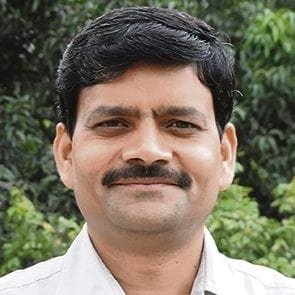
Award: Campaigner (National)
DR Ajay Kumar Gupta
Member of National Environmental Science Academy New Delhi
Dr Ajay Kumar Gupta’s on a mission to rally support for clean environmental policies in India, where he fears existing environmental laws aren’t being implemented.
Toxic gases from industries, the discharge of untreated effluent waste into inland water bodies, the unregulated and heavy use of pesticides in agricultural fields and the open, unattended burning of urban and rural waste are just some of the environment threats in India.
Ajay travelled to parts of the country where pollution was alarmingly high. Undeterred by the ‘initial reluctance’ of officials he met, Ajay pressed harder and a campaign came together that started to unite social groups like the Rotary Club, Inner Wheel and District Environmental Club. ‘I started campaigning for clean air, water, soil and food at the grassroots level in my town, Yamuna Nagar’, Ajay told PQ. ‘It soon spread to the entire state of Haryana – and then the nation.’
Yamuna Nagar is home to 2,000 major producers of dioxins, which belong to the so-called ‘dirty dozen’ group of dangerous chemicals known as persistent organic pollutants (POPs).
‘The government officials are paying no heed to it and there are threats from industry tycoons’, Ajay told PQ. He took the matter to the High Court of the State of Haryana. A similar writ in The Supreme Court of India has been filed to protect millions of schoolchildren from the toxic gases emitted in school laboratories that have no fume hoods or safety glasses.
‘Awards for such efforts will give strength to persuade the policymakers to implement and enforce environmental laws across the entire country’, Ajay told PQ. ‘The magnitude of dreaded diseases and cancer-like cases due to environmental degradation has become so alarming that it needs support from all corners of the globe.’
[/col]
[col span=”3″]
[/col]
[col span=”3″]
[/col]
[/row]
 Play Video about This Rock Might Just Save The World
Play Video about This Rock Might Just Save The World Play Video about Play 2 hours of rock
Play Video about Play 2 hours of rock Play Video about Play 2 hours of brook
Play Video about Play 2 hours of brook Play Video about Play 2 hours of sheep
Play Video about Play 2 hours of sheep

















